#017. Tough Luck, or, the Friction of Fate and Faith
A Failed Review of Fatima Bala's "Broken: Not a Halal Love Story"
When the head of the match and the matchbox clash, a spark is birthed. If it is the wheels of a car against the road-surface, a motion is born. And here, in magic and wonder, the friction of fate and faith gave birth to a moving spark, a missile of emotion. And we find ourselves trailing it till it (crash)//(landed).
I write. I read. I think I read more than I write. But when I read, I found myself drifting towards nonfiction and poetry. And that's why I could make a list of novels I've read in my entire life. I can't bold of 30 novels. And that's the number of novels some people read annually, and some even 100.
But among the few that I've read, Broken by Fatima Bala had been a magical one. One thing that will make it memorable is that: I started reading it on a Saturday and completed it by Tuesday. 4 days for a novel of 371 pages. For someone who when he read the few he had read, one took him an average of 4 weeks. And I must confess that the book is unputdownable.
God abeg. I don't want this post to be too long 🤲🏽😁
Here's what I have for you:
• Adnan bawo 😁
• A quick talk about styles
• The lovers named Insom & Niac
• You call it suspense, I call it surprises
• When I get to a new place, I try their foods
• The compromise of faith— grab & slip
• Intermissions + Intermissions + Fate = Adventures
• Knowing or meeting the Author made the book felt different
• Some quotes fron the book
• Adnan bawo 😁
When I read to where Afreen said “Oh gosh, I’m such a mess. Everything is a mess! And now, with Adnan in the mix –”; I was like: "Haa! Adnan keh. Adnan bawo." 😁
I've known the great Adnan, progenitor of the Prophet (SAW). Then the fantastic Adnan Oktar (Harun Yahya), and Adnan Menk, brother of Mufti Menk.
And I was eager to know what character the Adnan in this novel is. This is because my son is named Adnan. And most of the persons I mentioned above are whom I picture for him to emulate. Go find out who that is in the book.
• A quick talk about styles
Fatima’s prose is lyrical without being preachy, and she handles religious matters with care. With enormous care. And, you can tell she understands the community she's writing from—and isn't afraid to prod its quiet hypocrisies. Her writing feels like a secret voicenote from a friend who knows better.
I've read novels that are chapterized with dates. I've seen some with names of characters. And I've seen those with subtitles. Fatima Bala uses all in Broken.
And I loved her style of translating non-English words, mostly Hausa and Arabic, particularly how the translations follow the original language immediately, and are not put in brackets.
And then at a point, she started interchanging the narrators: sometimes first person, other times second/third person.
And yes, this is a romance. There are moments you whisper “Astaghfirullah” under your breath. Some scenes just had me clutching to my tasbih. 😁 Fatima Bala looked at halal romance and said: what if we just... didn't?
So, truly, don’t expect halal romance wrapped in nikah proposals. Just expect to read about two people trying to navigate love with one hand on the Qur’an and the other on their emotional damage.
• The lovers named Insom & Niac
It all began with two stumbles: one around a bookstore, and the other in his parent's room. When we stumble, we struggle to not fall. But these lovers did not. They fell, for each other, and in love. They did not want to rise, but the friction of fate and faith dragged them up from that fall.
The novel follows Faiza and Ahmad, two people flailing in the same emotional torrent but on opposite theological axes. Faiza is devout, private, and full of the kind of self-discipline that turns Instagram off during Ramadan. Ahmad, on the other hand, is liberal, charming, and just self-aware enough to be dangerous. When their paths cross, the story became a volcanic eruption—and gradually simmers, slowly, painfully into a slight tremor, into one very not halal situationship.
One time during their late night chats, Ahmad said Faizah is insomniac because it seems she doesn't sleep. From then, he started calling Faizah "Insom". Later on, we found Faizah saving Ahmad's phone number as "Niac." 😁 Their chemistry was simmering, like a chai left too long on the stove.
Between them, there is longing so intense you can smell the rosewater in their DMs. But in-between everything, we have spiritual guilt, society’s loud expectations, love trips, stumbles, and—true to the title—breaks.
Ahmad was a red flag, but in lowercase—just emotionally unavailable with a prayer mat.
• You call it suspense, I call it surprises
She has a way with suspense. You won't see it coming. You won't ever see it coming. It will just happen and catch you unexpectedly.
And the twists in the novel are enormous, and beautifully so.
One is the surprise visit by Ahmad to the Kaltume Nikkah 😊
Another is his strange appearance at the volunteer firm "Inn From the Cold"
Lastly— I do not want to share this, but there are many other surprises that will wow you more than this, but this really got me— one of my biggest surprises is the Cain Mosni Foundation discovery. It is a testament to how creative the author is. I'm sorry, I won't share it. Go read and find out yourself.
I changed my mind again. Ahmad wanted to be giving Faizah some financial assistance, but she refused it since there relationship had gone south. She went out seeking for sponsorship for her NGO. Luckily for her, she got about three and Cain Mosni foundation was the premium donor. One day, she inquired into the foundation and discovered that when you spell Cain Mosni from the back, it gives you Insom Niac, and that's when she discovered that the support have been coming from Ahmad.
Omoh. When I read to that point, I shouted Ahmad na weyrey 😁 I laughed hard. But I realized the crazy person is the author. Naming is a gift for Fatima Bala.
And it's actually a covenant. I call my wife "Ọrẹ wa" and my son "Aboki"; both meaning "Friend" in Yorùbá and Hausa languages respectively. I remember those who call me Èjìrẹ́, and the one I named Jonah because she sleeps a lot, unlike Insom who won't 😁 I remember Ihdina, name given to my father at zawiyah. Naming is something.
• Confessions
When Ahmad and Faizah visited an art gallery, and talked about an artist Ezgi, it felt so real that I actually checked for Ezgi on Instagram 😁
I got emotional 😭 At the first place, I struggled with my tears so it made me have catarrh. So at the second place, I had to allow the tears to flow. (My wife didn’t know about this 🙄)
I love how these words were used in the book: manipulative or persuasive, and, instant and constant. And one of new words: rodeo.
And errrm, don’t read if you’re emotionally stable. You might start romanticizing sadness.😐
Omoh! It slap me across the chest with feeling. At a point, I was very eager to finish and review it. Then I began to feel like 'Broken' isn’t really the kind of story you review. It’s the kind you recover from.
But I've reviewed it, so you know what that is
• When I get to a new place, I try their foods
..and books are not exceptions—they say stories let us travel—and I've traveled in books. Broken took me straight into the kitchens, patios, and quietly complicated dinner tables of Canada.
There’s sushi and sashimi on neat platters. Espresso and cappuccino poured with care. Alfredi, gnocchi, smoked salmon bites dressed in shallot sauce and asiago cheese on crisp arugula. Quiche, croissants, Timbits, rigatoni—and bacon, always bacon, whispering at the edges of halal boundaries.
It’s not just the meals—it’s the mood. Broken is full of food as gesture, food as ritual, food as tension. It’s what’s served and what’s refused. It’s comfort, curiosity, compromise.
A little taste of the West through the eyes and conscience of someone still deciding what’s permissible, and what’s simply... desired. No dish is neutral here. Every bite is a boundary test. And that’s what makes it feel so real.
•What else to look out for
Look out for Afreen, my favourite person, one who asks questions and answers it herself.
Look for turaren wuta, and oud bakhoor.
Look out for culture: a critic said Fatima Bala showcased a big Northerner's wedding, the Kaltume Wedding in Canada, and did not share sufficient traditions. But for me, it needs not be sufficient, but should be adequate.
It is in the novel that I learnt about Kamu, catch the bride; kayan lefe, bridal gifts; atamfa, patterned fabric; gaisuwa, wedding introduction; gyaran jiki, local spa treatments often done for brides which include but not limited to halawa, a sticky sugar and lemon mix, and kurkum paste; saukan Qur’ani, Quranic recitations; the nikkah proper; and kai amarya, conveyance of the bride.
• The compromise of faith—grab & slip
CAVEAT: This part will read like sermon. Didactic. Pastoral. Preachy; And in the Islamic light. So you can skip it if you mind. But you'd love it if you read.
This is how darkness creeps into the heart: like a dot of biro on a plain sheet, the first would look normal, until you begin to count 10, 20, to 50 dots, and you'll realize how messy the sheet has become.
And we witness that in Faiza's life. One who cringes about how Afreen lied about going to the Central Library when of course they were going to the bakery; who murmured "haram" anytime an impermissible act was done; now became comfortable with such acts. Maybe not so comfortable, but found herself doing them even if her conscience will fight her later.
The defeat started from when Faizah said “We can’t be alone together.” And Ahmad responded: “Let me guess, your YouTube Muftis said that?”
Then, she found herself here:
His eyes got softer. “I’m sorry,” he swallowed. “I’m sorry I pushed you to do something you weren’t ready for.”
I shook my head. “No, no, no. You didn’t push me,” I said, then adding in a whisper: “I wanted to.”
Yes. That's it. Everyone wants to. Everyone is capable of it. Whatever tempts you is actually in your capacity to execute. If not, you won't even experience the temptation. You'll just see yourself escape little offences, and dive into the big big sins.
Here's her confession:
I could deny it as much as I wanted, but I was slowly falling deeper into sin, and the scary thing was that I was not even fighting it anymore.
And that's why Qur'an says: "La taqrabu zinna", that is "Don't go near zinna." It doesn't say do not do it. It says do not near it. By this, it's telling you to avoid an enabler. So, a little sign in someone who'd influence you badly, you should run away.
Faizah saw it:
I looked away. The tattoo, the haram relationship with his ex, the non-halal meals, And now, alcohol. What else is there? Are these all signs that he’s not the one for me? What am I doing with someone who lives like the laws of our religion don’t apply to him?
You know the situation when people approach some aspect of religion with logic. Ahmad is such person.
See, sometimes you follow it blindly because that's why it is religion. It may contradict logic, but what about reasoning?
But No. We all are selective in our obedience. We choose what we want to obey.
Here's the way forward:
Admitting you're wrong and not giving excuses. Don't try to justify your shortcomings.
We all are truly struggling. No one is better than the other. No one is even a lesser or greater Muslim. We are all Muslims. Our struggles only differ. And the story in Broken was spiritual warfare.
But beware: When people are telling you I like your kind of Muslim, then, you are getting finished. When they call you the liberal Muslim.
However, if you accept that you are a lesser Muslim and just fight your struggle— what makes you lesser, then you'll be better.
Faizah spoke of Ahmad's family: This family was more fluid and liberal than mine was, even though we shared the same identity – Muslim and Northern.
Let your family be magnanimous, but don't be indulgent. Don't be fluid and liberal. Be conservative and mild.
Above all, I think the author, Fatima Bala, shares our collective struggles in the novel. That we are not alone. It is an awareness. It is also a warning.And don't say you'd change him or her. It may eventually happen that the other person will just influence you. Faizah did not even try to change Ahmad yet he picked some Sunnah. And he influenced her into doing things, too.
• Grabbing sunnah and letting it slip
The following are some traditions practiced in the book which I find relatable as a Muslim:
Saying salaam as they enter house
Exchange of gifts – between the Faiza's and Afreen's mothers
Monday and Thursday fasting
Minding your business
Picking dangerous substances from the road
But sorrow made let a sunnah slip off her grip: She dump half of her food in wastebasket. Ensuring that food is not wasted is a sunnah.
• Intermissions + Intermissions + Fate = Adventures
The elevator incident 🤦🏾♂️ My heart almost ran out of my chest. I thought the event before it was the intermission.
But the real intermission is elsewhere: what mallama zainab came to testify upon.
But then, the intermission de facto was in the adventure: two matters that have made Ahmad move about, one made him move from Kano to Niger to France to Suleja to Niamey to Minjibir; the other from Malaysia to Morocco.
The result of the second adventure is the intermission de facto.
But the thought of the fate of the result with the Justice is the intermission per se.
• Knowing or meeting the Author made the book felt different
As in, I didn't know why I was picturing Fatima Bala in Faizah. If the book is by a male author, I'll picture him in Ahmad. It became more funny since the story is set in Canada, where the author resides. But I later changed that viewpoint as I read on.
I met Fatima Bala at Ake Festival, 2024. We both were guests. While she had a book chat on "Broken", I was a Panelist and discussed "Documenting New Voices" in the company of Wale Lawal and Ainehi Edoro, while Timi Sanni hosted us.
It was awesome to see her nodded in affirmative to some of my submissions, here:
What they say about like minds, and when you're making sense to the intellectuals.
And yes, that's where I bought Broken and had it autographed.
When I shared about meeting her on X, she responded with a feedback on my activities:
She might likely be at the next Ake Festival for her newly republished book Hafusatu Bebi. Be on the lookout, and go get the book ahead of the event.
https://www.instagram.com/bookshop_101?igsh=cW9mejR5MWs3ZGc2
And if you've not read Broken, you need to go get it now.
https://www.instagram.com/spine_and_label?igsh=eW0yb2cxb2w0bWY5
• Some quotes from the book
Our religion advocates for marriage when a girl finds a suitor, and our culture advocates for the best suitor, not just anyone. Depending on the girl’s family, the best suitor had to have a lot of things – wealth, lineage, family status, and so on.
There was a bulb hanging above that cast a shadow on the wall behind the pile of items, and it displayed a woman wearing a wide-brimmed hat, looking into the far horizon. It was spectacular. The element of surprise made it even more beautiful. “Shadow art,” Ahmad said, as he took in the awe on my face, “not everything is at it seems.”
A slight breeze that brushed past us took the flame off one of the candles between us. I watched as the ghost of smoke swirled upwards and wondered, like the candle, if our flame had gone away, if the relationship had now ended.
He smiled at me, revealing a toothy grin; it reminded me of a rabbit.
According to science, I could attribute the sudden glow to the love hormone – oxytocin.
...the fibres of my reality became entangled with the webs of destiny and my little globe of a dream woven in happily-ever-after shattered into a tiny million pieces.
“Any man can love you. But will that love remain on the days you’re difficult to love?”
Every few seconds, his hands would reach up, holding up his phone to take a selfie, always sure to include a few white people in the background. 😂.
So yes, this is a failed review.
I do not want to be restricted by formal literary rules. I just want to reveal without revealing much. I didn’t even decide what I'd make of the book, but I finished the book with the strange ache of recognition. And that, I think, is a kind of success.
Broken is not a fairy tale. It’s a mirror that shows you the soft, messy bits of love in a world of rules, judgement, and genuine faith. You’ll cringe. You’ll relate. You’ll probably make wudu mid-chapter.
What struck me wasn’t the love story itself, but everything that hovered around it: the faith, the doubts, the guilt, the silence. And that's what make it a masterpiece. Fatima Bala did not come to play. She came to peel scabs.
If I'd rate, 10/10 would cry in wudu again.
If you like your fiction honest, Muslim, and just a little messy, Broken is worth the ache.
If you’ve ever loved someone in a way that made you second-guess your boundaries, your faith, or your entire personality—this one’s for you.
But read with care. And maybe a glass of water nearby. Or a tasbih.
Whichever helps first.
Do you like what you read today?
What would you like me to write about next?
Let's jaw-jaw in the comment.
Ọdàbọ̀, kó si àdìtú tí a kì í tú.
Farewell, may no mystery remain unsolved.

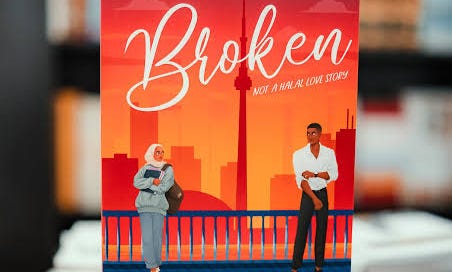



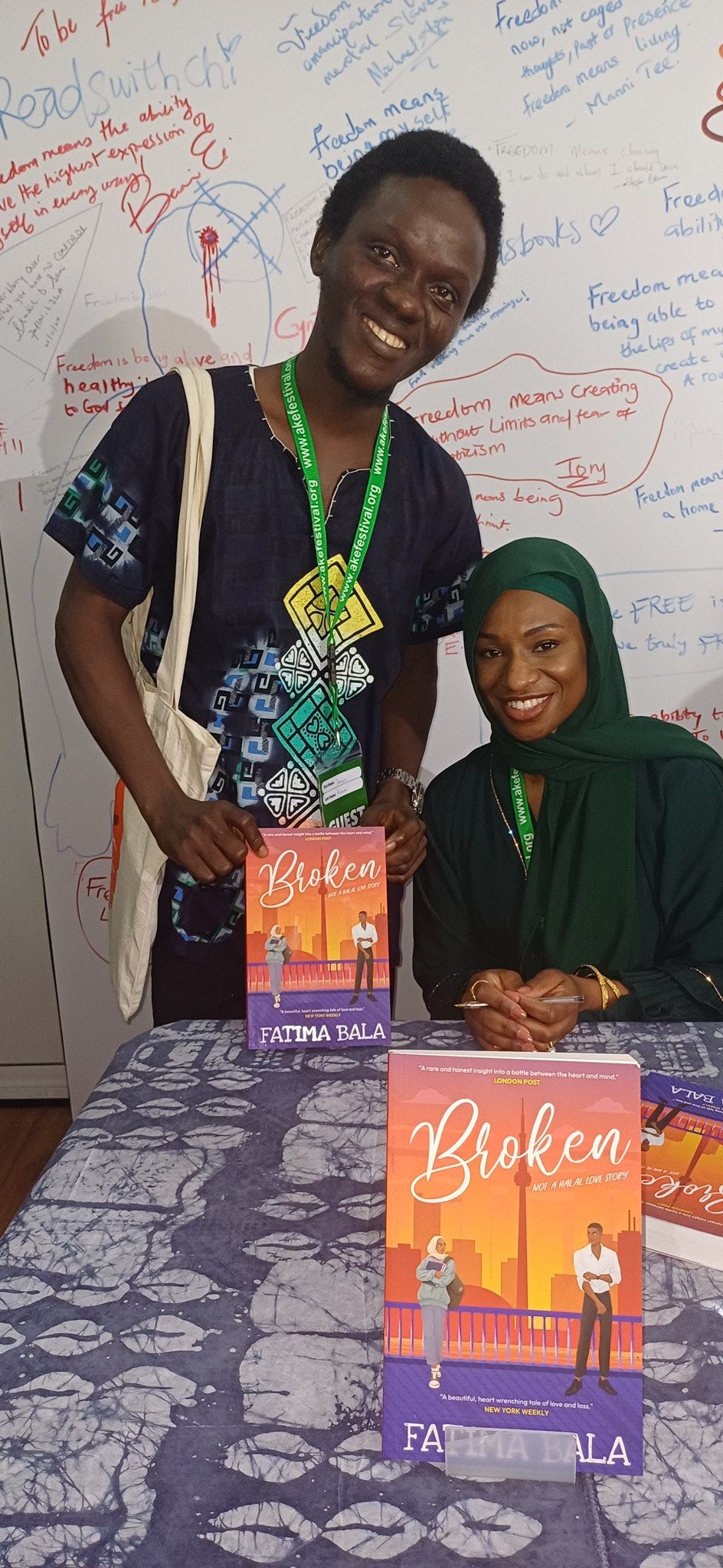
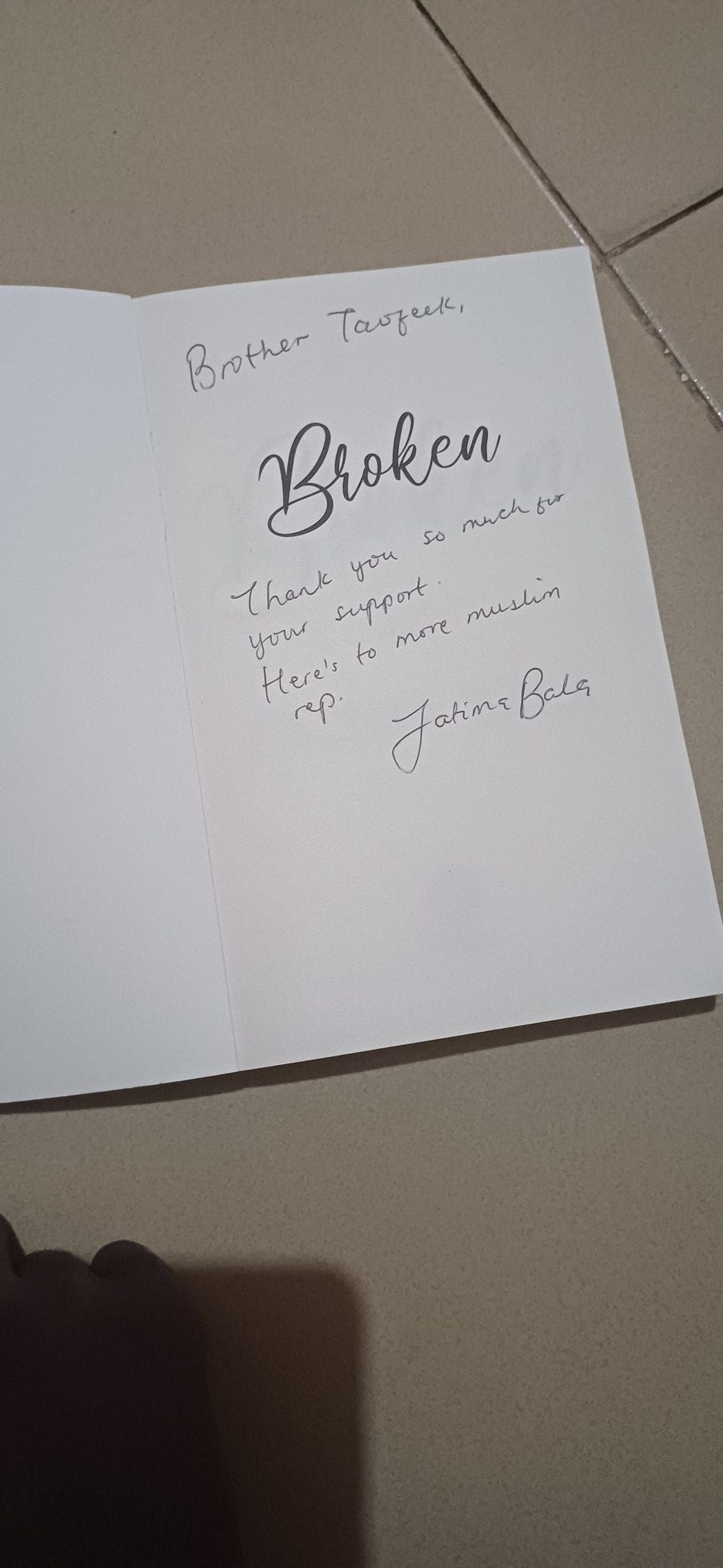
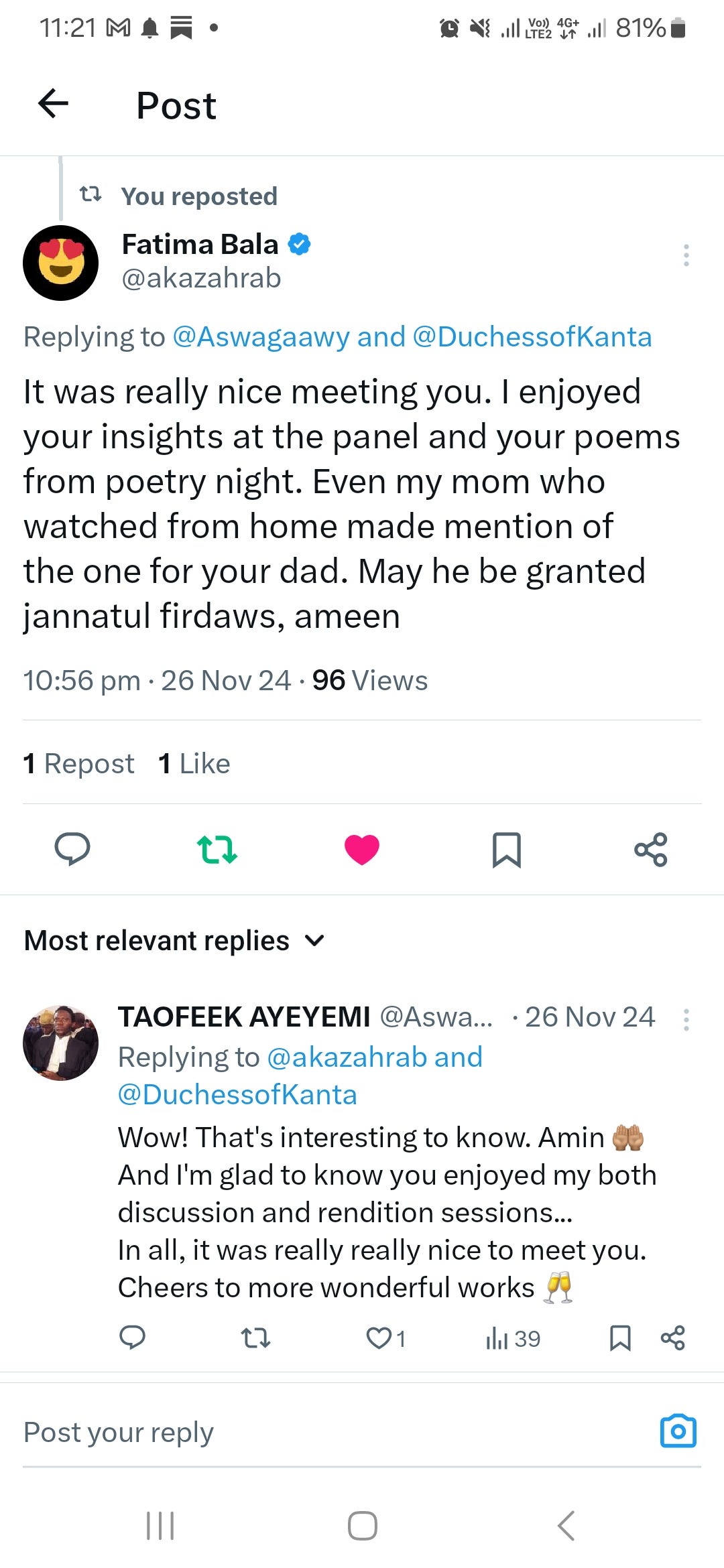
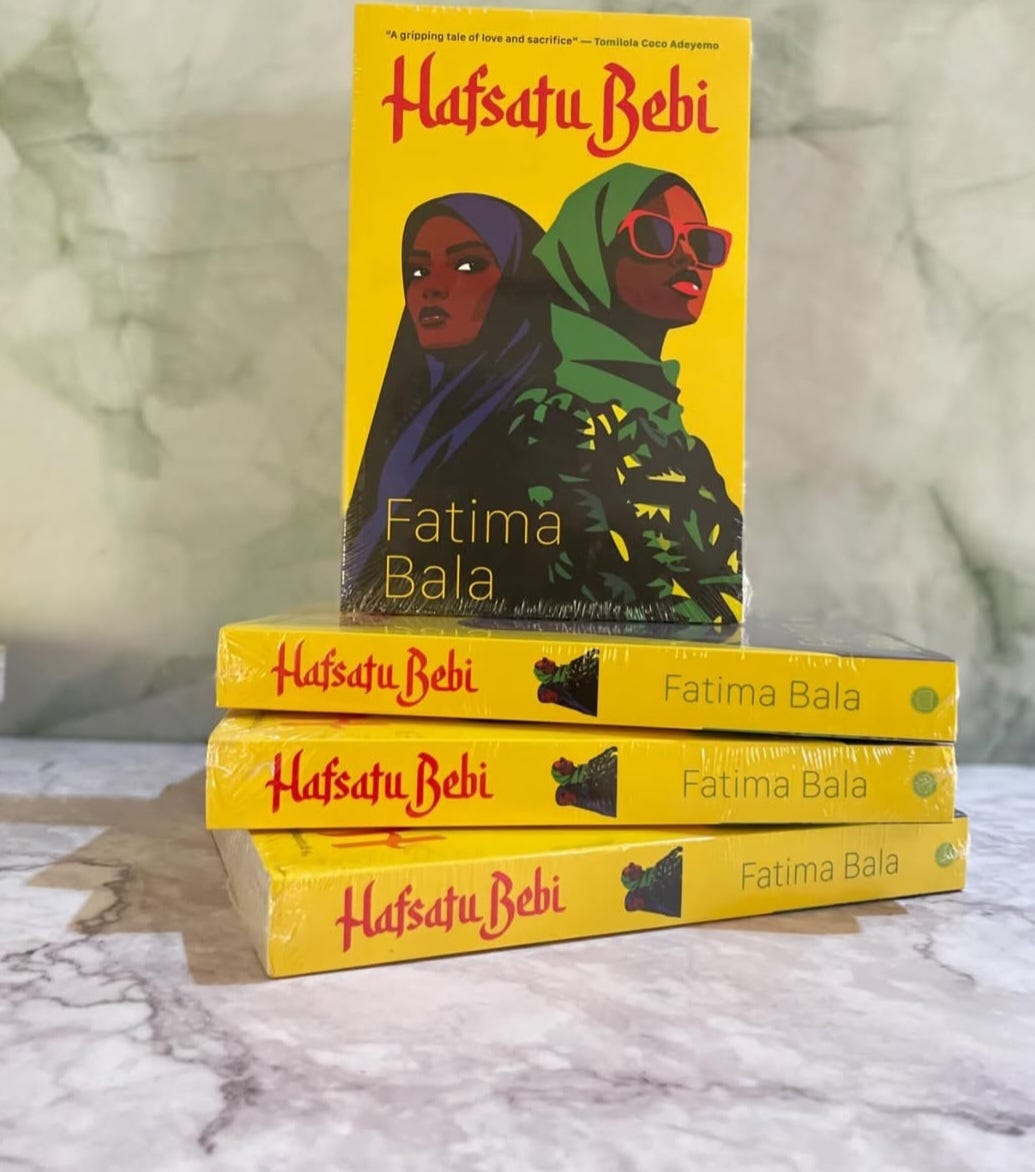
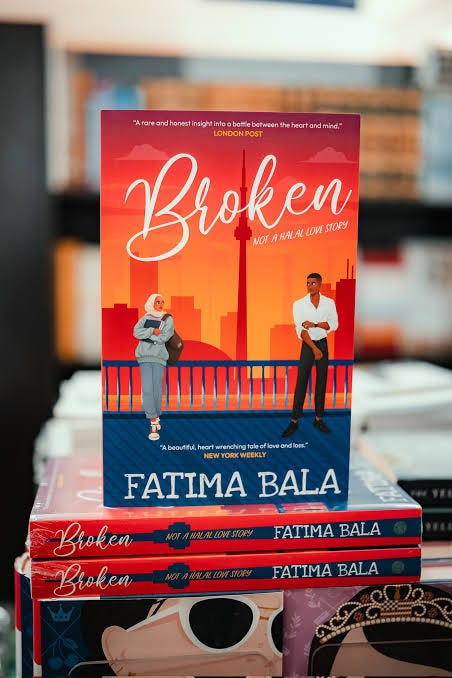
I enjoy reading this. Feels like reading broken a second time.
Beautifully written. Now, make I go enjoy the book.